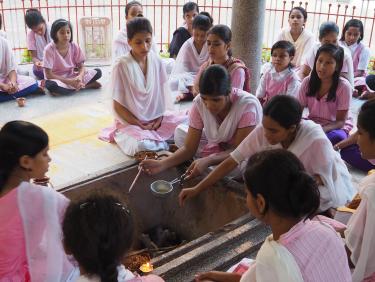Faculty of PhilosophySouth Asian Cultural and Religious History/Classical Indology
Classical Indology deals with cultural and religious history. The main focus in teaching and research is on the classical languages, cultures and religions, and literatures and philosophies of South Asia with a special emphasis on Sanskrit.
The major languages required in order for students to read and understand texts on cultural and religious history in South Asia are Sanskrit and Pali. The wide variety of these texts are characterised by rich and still relevant religious, scientific and artistic traditions. In addition, students can also learn modern languages such as Nepali or Singhalese. In cooperation with the Chair of Modern South Asian Languages and Literatures, students can also learn Bengali, Hindi, Tamil and Urdu as well as classical and colloquial Tibetan at the Chair for Buddhist Studies. Students further focus on gender studies, research on rituals and other religious-cultural topics and are provided the opportunity to participate in field trips to South Asia.

Special Features and Characteristics
A special feature of the subject in Heidelberg is its ethno-Indological orientation, i.e. the combination of historical text analysis with field trips in South Asia. The academic programme also focusses on orally or performatively transmitted traditions and investigates their connections to the respective texts. Therefore, the subject is geared toward historical as well as modern South Asia and uses philological, cultural scientific and interdisciplinary approaches.
Currently popular topics include life cycle rituals, religious and family festivals, temple rituals and sacrifice rituals.
In addition to the regular courses, the department for Cultural and Religious History of South Asia also organises courses that focus predominantly on the practical application of methods from cultural and religious studies as well as Digital Humanities. For example, a 'Crash Course in Spoken Sanskrit' is held regularly. This course and others complement the regular range of courses in philology and literary studies and are organised in cooperation with partner institutions in Germany and India.
Research
In research and teaching, the department for Cultural and Religious History of South Asia has a strong link to the Heidelberg Center for Transcultural Studies, which predominantly analyses cultural exchange processes between Europe and Asia. In research, there is close cooperation with the Heidelberg Academy of Sciences and Humanities, which currently has two Indological Research Centres, and the École Française d'Extrême-Orient (EFEO), Pondicherry.
Research focusses on the following areas:
- rituals and festivals
- temple traditions
- local sciences (e.g. ritual theory)
- gender and religion (especially Hinduism and Buddhism)
- Buddhist law of religious life
- inter-religious debates and discourse between the religions
- historico-religious and historico-legal sources of Nepal
- interactions between mythology, historiography and performance
Regional foci in field research are on
- South India
- Nepal
- Benares
- Sri Lanka
Occupational Areas
In addition to careers in academia (following a post-graduate/doctoral degree), graduates of Cultural and Religious History of South Asia can also find work in various state or private organisations and businesses worldwide. Fields of employment can be found in many areas. These are, for example:
- non-university research
- culture and knowledge management
- archives and libraries
- intercultural communication
- public relations
- foundations
- museums and exhibitions
- journalism
- communications and translation agencies
- training and consulting institutions
- culture management
- tourism
- development cooperation
- diplomatic service
Degree variants
Master, consecutive
Learn more
Insights

I have always been interested in South Asia and opted for Heidelberg after my Bachelor’s degree in Venice because it is a great place to learn Sanskrit, the institute is world-famous and the atmosphere among peers and professors is very congenial.
Anna Scarabel, 25, South Asian Cultural and Religious History, 6th semester Master



